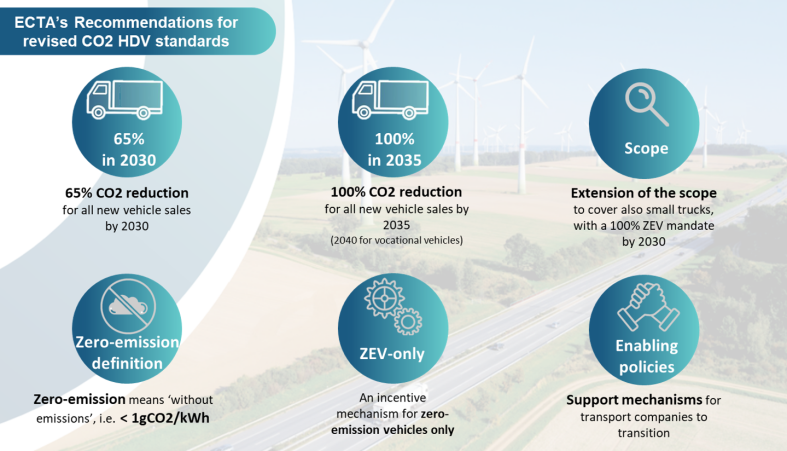The European Clean Trucking Alliance (ECTA) sees the regulation on CO2 standards for HDVs as the most important tool to drive the transformation of the sector towards zero-emission trucks. The ambition of the revision will determine whether and how Europe will advance the global race to zero-emission trucking. Importantly for actors in the freight and logistics sector, it will also dictate the level of supply of zero-emission vehicles, meaning the extent to which transport companies are able to purchase these vehicles. The higher the ambition in the short and medium term, the more zero-emission vehicles are produced and the quicker they become more affordable for all hauliers across Europe.
ECTA highlights the following shortcomings of the Commission’s proposal for the revision of the HDV CO2 standards and urges co-legislators to significantly strengthen the proposal:
- Strengthening the 2030 CO2 reduction target, with a target for all new vehicle sales of at least 65%;
- The end goal needs to be 100% zero-emission, with a 100% zero-emission target in 2035 for all new small, medium and heavy trucks (2040 for vocation vehicles);
- Extension of the scope of the regulation to cover also small trucks, with a 100% ZEV mandate by 2030;
- Zero-emission means ‘without emissions’, i.e. trucks as emitting less than 1gCO2/kWh;
- An effective incentive mechanism for zero-emission, with a ZEV-only incentive;
- Enabling policies pave the way for the zero-emission trucking transition, including additional support mechanisms for transport companies to enable them to transition in the most time effective manner.
In short, the CO2 standards can be an effective tool to set the pace for the ZEV transition for truck OEMs as well as providing much needed certainty to companies operating in the freight and logistics sector. The European Parliament and Council now need to step in and strengthen the Commission’s proposal, guiding the zero-emission transition of the sector with ambition and foresight for decades to come.





